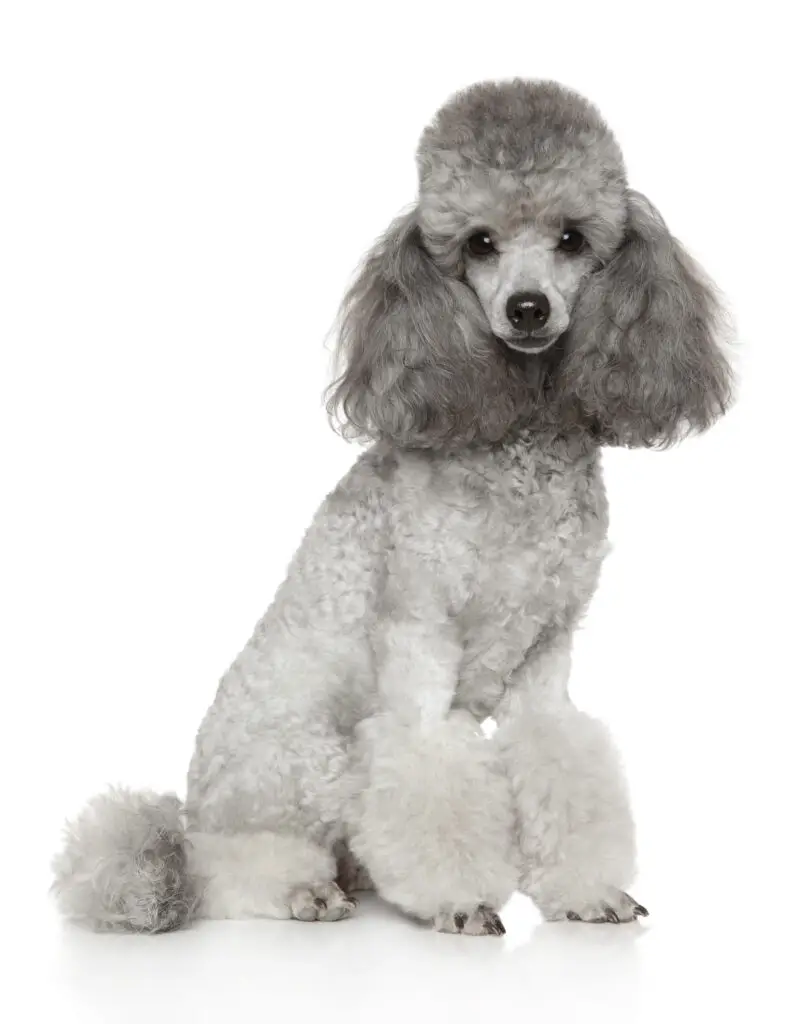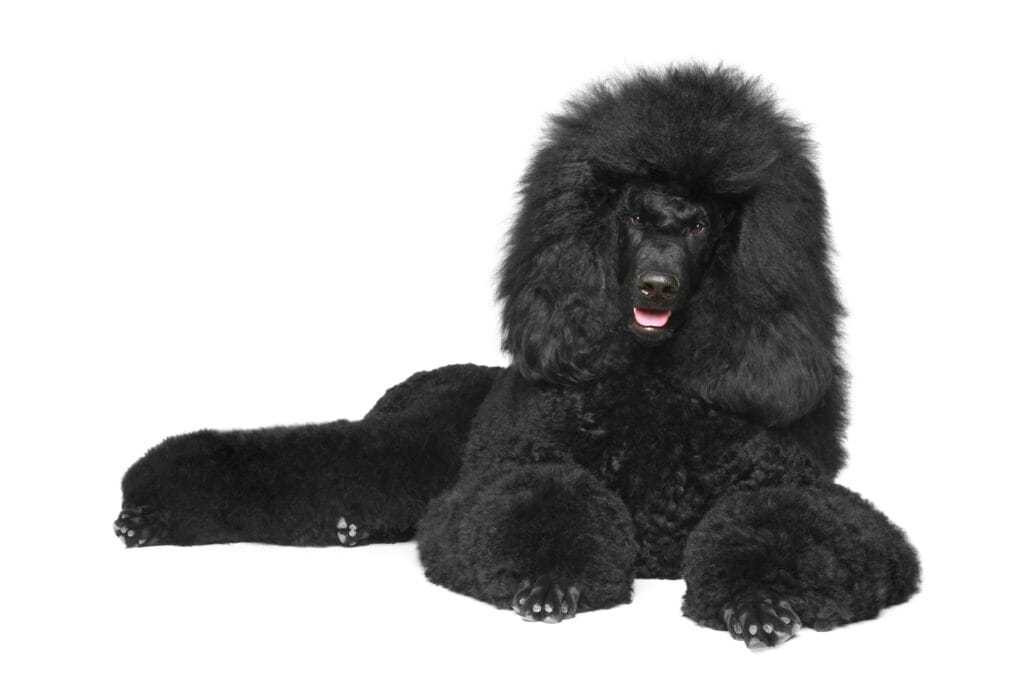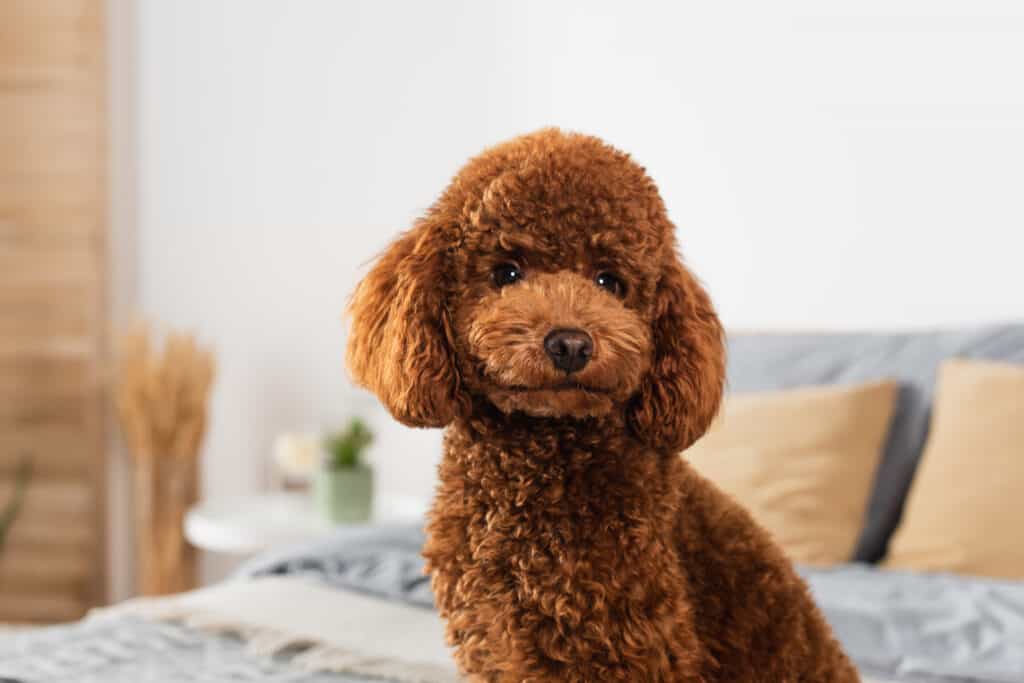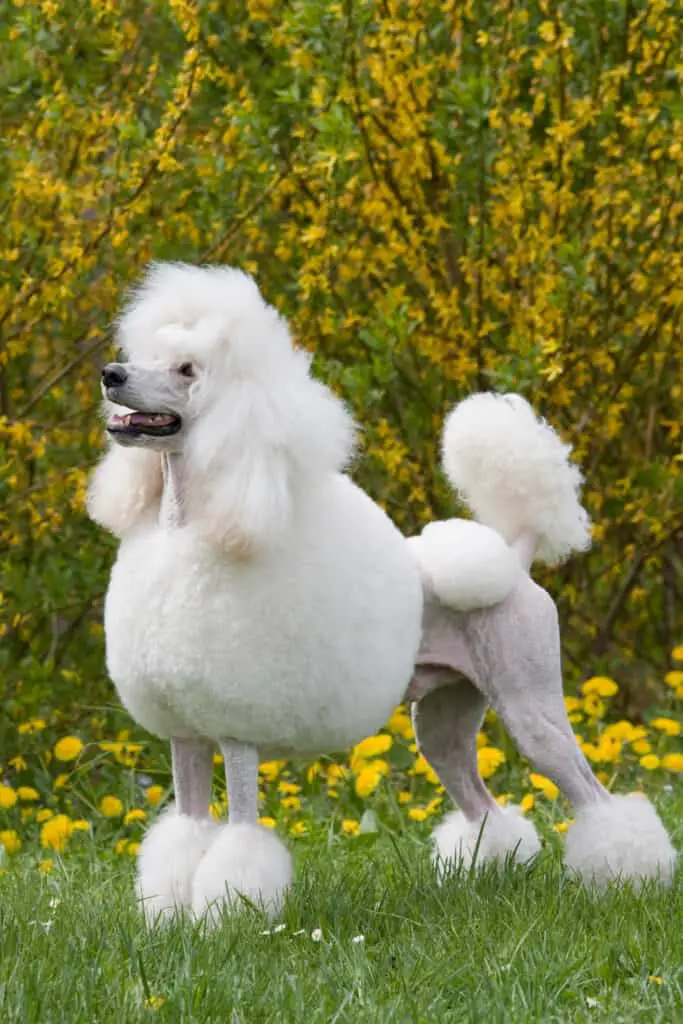Our website is supported by our users. We sometimes earn money when you click an affiliate link and make a purchase. This is at no extra cost to you and helps us to create quality content. Thank you for your support. For all that have shown us such wonderful support, we thank you from the bottom of our hearts!
Poodles are a breed of dog that are known for their distinctive curly coat and elegant appearance.
They are intelligent, active, and make great companions for families and individuals alike.
Poodles come in four sizes: Standard, Medium, Miniature, and Toy, and are recognized by the American Kennel Club as a non-sporting breed.

One of the most notable characteristics of poodles is their coat.
It is thick and curly, and comes in many colors, including white, black, brown, gray, and apricot.
Poodles are also known for being hypoallergenic, which makes them a great choice for people with allergies.
However, their coat requires regular grooming to keep it healthy and free of tangles.
Poodles are not just beautiful dogs, they are also highly intelligent and trainable.
They are often used in various dog sports, such as agility and obedience competitions.
They are a common parent breed for many of the doodle and poo designer dogs like:
Poodle Designer Dogs
Aussiedoodle
Boxerdoodle
Bernedoodle, Mini Bernedoodle
Cavapoo
Dalmadoodle
Goldendoodle, White Goldendoodle, Black Goldendoodle
Havapoo
Irish Doodle
Jackadoodle
Labradoodle, White Labradoodle, Black Labradoodle
Newfypoo/Newfiepoo
Pekepoo
Pomapoo
Poochon
Poogle
Pugapoo
Pyredoodle
Schnoodle
Sheepadoodle
Shepadoodle
Shihpoo
Terripoo
Weimerdoodle
Westiepoo
Whoodle
Yorkiepoo
The main reason that many breeders mix the Poodle is because the Poodle is intelligent, low-shedding and hypoallergenic.
Poodles are also known for their friendly and outgoing personalities, which makes them great companions for families with children.
Whether you are looking for a loyal and affectionate pet or a competitive athlete, a poodle may be the perfect choice for you.
History
The Poodle is a breed of dog that is believed to have originated in Germany during the Middle Ages.
Most cynologists believe that the Poodle was developed from a dog similar to the modern-day Standard Poodle.
The Poodle was Germany’s water dog, just as England had the English Water Spaniel, France the Barbet, Ireland the Irish Water Spaniel, and the Netherlands the Wetterhoun.
The word “Poodle” comes from the German word “Pudel,” which means “to splash in water.”
The Poodle was bred to be a water retriever, and it was used to hunt waterfowl.
The Poodle’s dense, curly coat kept it warm when swimming in cold waters.
Over time, the Poodle became popular in France, where it was known as the Caniche.
The French bred the Poodle to be a companion dog, and they also developed the breed’s distinctive haircut.
The Poodle’s coat was trimmed to help it move more easily in the water, but it also had the added benefit of making the dog look more elegant.
During the 18th and 19th centuries, the Poodle became a popular breed among European nobility.
The breed was used in circuses and dog shows, and it was also used as a hunting dog.
The Poodle was recognized by the American Kennel Club in 1887, and it is now one of the most popular breeds in the United States.
In summary, the Poodle is a breed of dog that originated in Germany as a water retriever.
The breed was later developed in France as a companion dog, and it became popular among European nobility.
The Poodle is now one of the most popular breeds in the United States and is known for its distinctive curly coat and elegant appearance.
Physical Characteristics of the Poodle
Poodles are a breed of dog that comes in three different sizes: Standard, Miniature, and Toy.
The Standard Poodle is the largest of the three and can weigh between 40 and 70 pounds, while the Miniature Poodle can weigh between 10 and 15 pounds, and the Toy Poodle can weigh between 4 and 6 pounds.
The height of a Poodle can vary depending on the size, but they typically stand between 10 and 15 inches tall.
One of the most distinguishing features of the Poodle is its curly coat, which can come in a variety of colors such as apricot, black, blue, brown, cafe au lait, cream, gray, red, silver, silver beige, or white.
The coat is long and requires regular grooming to prevent matting.
Many owners choose to give their Poodle a “poodle cut,” which involves trimming the hair short on the body while leaving a puff of hair on the tail and legs.
Poodles are known for their appearance in dog shows, and their coat is a major factor in their success.
The curly coat is hypoallergenic, which makes them a popular choice for people with allergies.
Poodles are also known for their swimming abilities, and their coat helps to keep them warm in cold water.
In terms of physical characteristics, the Poodle is a medium-sized dog with a long, narrow face and floppy ears.
They have a high energy level and require daily exercise to stay healthy.
Poodles are also known for their intelligence and trainability, which makes them a popular choice for obedience competitions.
Overall, the Poodle is a unique and elegant breed with many physical characteristics that set them apart from other dogs.
Whether you choose a Standard, Miniature, or Toy Poodle, you can be sure that you will have a loyal and loving companion for many years to come.
Temperament & Training
Poodles are known for their intelligence, friendly temperament, and eagerness to please their owners.
They are an active breed that requires regular exercise and mental stimulation to stay healthy and happy.
Poodles are also highly trainable and excel in obedience training, agility competitions, and other activities that require mental and physical agility.
As a highly intelligent breed, Poodles require plenty of mental stimulation to prevent boredom and destructive behavior.
Engage your Poodle in regular playtime, training sessions, and other activities that challenge their minds and keep them engaged.
Poodles are also highly social and affectionate, making them great family dogs, therapy dogs, service dogs and companion dogs.
When it comes to training, Poodles are considered one of the easiest breeds to train due to their intelligence and eagerness to please.
Positive reinforcement training methods work best with Poodles, as they respond well to praise and rewards.

Consistency and patience are key when training your Poodle, as they can be sensitive to harsh training methods.
Poodles are an active breed that requires regular exercise to stay healthy and happy.
They enjoy activities such as walking, running, swimming, and playing fetch.
Poodles also excel in activities that require mental and physical agility, such as obedience training, agility competitions, and hunting.
Poodles are known for their low shedding coat, making them a great choice for those with allergies. However, their coat requires regular grooming to prevent matting and tangles.
Regular brushing, bathing, and trimming are necessary to keep your Poodle’s coat healthy and looking its best.
Overall, Poodles are an intelligent, active, and affectionate breed that make good family dogs and companions.
With regular exercise, mental stimulation, and positive reinforcement training, your Poodle can thrive and be a happy and well-behaved member of your family.
Health Issues of the Standard Poodle
As a Standard Poodle owner, it is important to be aware of the health conditions that can affect this amazing dog breed.
While the Standard Poodle is generally a healthy breed, there are a few conditions that are more common in this breed than others.
Hip Dysplasia
Hip dysplasia is a common condition in many dog breeds, including the Standard Poodle.
This condition occurs when the hip joint does not develop properly, causing pain, stiffness, and difficulty walking.
While hip dysplasia is often hereditary, it can also be caused by environmental factors such as obesity or over-exercising at a young age.
Sebaceous Adenitis
Sebaceous adenitis is a skin condition that affects many dog breeds, including the Standard Poodle.
This condition occurs when the sebaceous glands in the skin become inflamed and damaged, leading to hair loss, scaly skin, and a foul odor.
While the exact cause of sebaceous adenitis is unknown, it is thought to be an autoimmune disorder.
Idiopathic Epilepsy
Idiopathic epilepsy is a neurological disorder is one of the genetic health problems characterized by recurrent seizures with no identifiable underlying cause, and Poodles are among the breeds commonly affected.
In this condition, seizures occur spontaneously and are often unrelated to other medical issues. Poodles with idiopathic epilepsy may experience episodes of abnormal behavior, loss of consciousness, and uncontrolled movements.
While the exact cause remains unknown, a genetic predisposition is suspected, particularly in Standard Poodles.
Diagnosis involves ruling out other potential causes for seizures through thorough veterinary examinations and diagnostic tests.
Treatment usually includes antiepileptic medications to manage and reduce the frequency of seizures.
Poodle owners should work closely with veterinarians to monitor and adjust treatment plans, as managing idiopathic epilepsy often involves a combination of medication, lifestyle adjustments, and ongoing medical supervision.
While idiopathic epilepsy can be challenging, many Poodles with this condition lead normal, happy lives with appropriate care and treatment.
Gastric Dilatation-Volvulus (GDV)
Gastric Dilatation-Volvulus (GDV), commonly known as bloat or gastric torsion, is a serious and potentially life-threatening condition that can affect Poodles.
This condition occurs when the stomach rapidly fills with gas and twists on its axis.
Poodles, particularly Standard Poodles, are considered a deep-chested breed, putting them at a higher risk for GDV.
GDV can occur suddenly and progress rapidly, leading to severe consequences such as restricted blood flow, damage to internal organs, and shock.
Common symptoms include unproductive vomiting, restlessness, abdominal distension, and difficulty breathing.
Immediate veterinary attention is crucial to diagnose and treat GDV effectively.
Preventive measures for Poodle owners include feeding multiple smaller meals instead of one large meal, avoiding vigorous exercise immediately after eating, and considering gastropexy surgery, which can help prevent the stomach from twisting.
Being aware of GDV risk factors and seeking prompt veterinary care can significantly improve the chances of a positive outcome for Poodles affected by this serious condition.
Von Willebrand’s disease (VWD)
Von Willebrand’s disease (VWD) is a hereditary bleeding disorder that can affect Poodles.
This condition is caused by a deficiency or dysfunction of von Willebrand factor, a blood clotting protein.
Poodles with VWD may experience prolonged bleeding after injuries, surgeries, or during heat cycles in females.
Diagnosis involves specialized blood tests to assess von Willebrand factor levels and function.
While there is no cure for VWD, management strategies focus on minimizing bleeding risks.
This may include avoiding certain medications and surgeries and, in severe cases, administering blood products or von Willebrand factor replacement therapy.
Responsible breeding practices, such as genetic screening, can help reduce the prevalence of VWD in Poodles.
Poodle owners should be aware of the potential for bleeding issues and work closely with veterinarians to develop a care plan that ensures the well-being of their pets, especially if VWD is identified through genetic testing.
Patellar Luxation
Patellar luxation is a condition that affects the kneecap, causing it to dislocate from its normal position.
This condition can cause pain, limping, and difficulty walking. While patellar luxation is often hereditary, it can also be caused by injury or trauma.
Hypothyroidism
Hypothyroidism is a condition that occurs when the thyroid gland does not produce enough hormones.
This condition can cause a variety of symptoms, including weight gain, lethargy, and skin problems.
While hypothyroidism is often hereditary, it can also be caused by environmental factors such as exposure to toxins.
Anxiety and Separation Anxiety
Anxiety and separation anxiety are common conditions in many dog breeds, including the Standard Poodle.
These conditions can cause a variety of symptoms, including excessive barking, destructive behavior, and aggression.
While the exact cause of anxiety and separation anxiety is unknown, it is thought to be a combination of genetic and environmental factors.
Eye Problems
Poodles are prone to several eye problems, including cataracts, progressive retinal atrophy, and glaucoma. These conditions can cause vision loss and require ongoing management to prevent further damage.
In conclusion, while Poodles are generally healthy dogs, they are still prone to certain health issues.
By being aware of these common health problems, you can take steps to prevent them or manage them effectively, ensuring that your furry friend lives a happy and healthy life.
Grooming Wavy or Fleece Hair of Your Poodle
Taking care of your poodle’s wavy or fleece hair is an important part of their hygiene and overall health.
Grooming your poodle coat regularly will help keep their coat clean, healthy, and free of tangles and mats.
Here are some tips to help you with the grooming routine.
Brushing
Brushing your poodle’s coat is an essential part of their grooming routine.
Though they have a fairly low-shedding coat, brushing helps to remove tangles, mats, and loose fur.
Use a slicker brush or a pin brush to brush your poodle’s coat.
Start brushing from the head and work your way down to the tail.
Make sure to brush in the direction of hair growth to avoid pulling or hurting your poodle.
Brush your poodle’s coat at least once a week to keep it in good condition.
Bathing
Bathing your poodle is another important part of their grooming routine.
Use a mild dog shampoo and lukewarm water to bathe your poodle.
Wet your poodle’s coat thoroughly and apply shampoo. Massage the shampoo into the coat and rinse thoroughly.
Make sure to avoid getting water or shampoo in your poodle’s eyes, ears, and nose.
Bathing your poodle once a month is usually enough to keep their coat clean.

Cutting Fur/Hair
Trimming your poodle’s fur or hair is necessary to keep their coat looking neat and tidy.
Use scissors or clippers to trim your poodle’s coat.
Make sure to trim your poodle’s coat evenly and avoid cutting too much hair.
It’s best to seek professional groomer if you’re not confident in trimming your poodle’s coat.
Clipping and Grinding Nails
Clipping and grinding your poodle’s nails is also an essential part of their grooming routine.
Use a nail clipper or grinder to trim your poodle’s nails. Make sure to avoid cutting the quick, which is the blood vessel that runs through the nail.
If you accidentally cut the quick, apply styptic powder to stop bleeding.
It’s best to clip or grind your poodle’s nails once a month to keep them at a healthy length.
If you are nervous about grinding or clipping your dogs nails, check out our articles on How to Grind Your Dog’s Nails and How to Clip Your Dog’s Nails.
Dental Care
Dental care is crucial for your poodle’s overall health.
Brush your poodle’s teeth regularly with a dog
toothbrush and toothpaste. You can also give your poodle dental chews or toys to help keep their teeth clean.
Make sure to schedule regular dental check-ups with your veterinarian.
Cleaning Ears
Cleaning your poodle’s ears is also important to prevent ear infections.
Use a cotton ball or a soft cloth to clean your poodle’s ears. Avoid using cotton swabs as they can push wax and debris further into the ear canal.
Gently wipe the inside of your poodle’s ears, with the cotton ball, ear wipes or cloth.
If you notice any signs of infection such as redness, swelling, or discharge, contact your veterinarian.
In summary, grooming your poodle’s wavy or fleece hair is an important part of their hygiene and overall health. Make sure to brush, bathe, trim, clip, grind, clean teeth, and ears regularly to keep your poodle looking and feeling their best.
Owning a Poodle
Owning a Poodle can be a rewarding experience. However, it is important to understand the costs associated with purchasing and maintaining a Poodle.
Cost of Purchase
The cost of purchasing a Poodle can vary depending on the size and breeder. According to PetBudget, a Standard Poodle puppy can cost between $600-$2,000, with an average price of $1,000. Miniature and Toy Poodles may cost more. When purchasing a Poodle, it is important to find a reputable breeder who health tests their dogs and provides a health guarantee.
Maintenance Costs
Special Training
Poodles are intelligent dogs that require mental stimulation. Professional obedience classes with experienced trainers typically cost around $100 to $300 for group sessions or $50 to $150 per hour for private sessions, according to A-Z Animals. Special training such as agility or therapy dog training can cost more.
Medical Costs
Poodles are generally healthy dogs, but they may be prone to certain health issues such as hip dysplasia, eye problems, and skin allergies. Regular veterinary checkups and preventative care can help catch and prevent health issues from becoming serious. According to Pet Keen, the average annual medical cost for a Poodle is around $500-$1,000.

Grooming
Poodles have a curly, non-shedding coat that requires regular grooming. Professional grooming can cost around $50-$200 per session, according to Happy Dog Breeds. Grooming supplies such as brushes, combs, and shampoos can also add up.
Adopting a Labradoodle
Labradoodles are a crossbreed between a Poodle and a Labrador Retriever. Adopting a Labradoodle can be a more affordable option than purchasing a purebred Poodle. Adoption fees can vary depending on the rescue organization, but they are generally lower than the cost of purchasing a Poodle from a breeder.
Finding Breeders
When looking for a Poodle breeder, it is important to find a reputable breeder who health tests their dogs and provides a health guarantee. The American Kennel Club (AKC) is a good resource for finding reputable breeders. The AKC also provides information on the different Poodle breeds and their characteristics.
Fun Facts
- Poodles are one of the most intelligent dog breeds and are known for their trainability.
- Poodles come in three sizes: Standard, Miniature, and Toy.
- Poodles were originally bred in Germany as water retrievers.
- Poodles have hair, not fur, which makes them hypoallergenic for some people.
- Poodles have a lifespan of around 12-15 years.
Frequently Asked Questions
What are the different types of Poodles?
There are three different types of Poodles: Standard, Miniature, and Toy. The Standard Poodle is the largest of the three and can weigh between 60-70 pounds for males and 40-50 pounds for females. Miniature Poodles are under 15 inches tall, and Toy Poodles are no more than 10 inches tall.
How much does a Poodle usually weigh?
The weight of a Poodle depends on its size. Standard Poodles usually weigh between 60-70 pounds for males and 40-50 pounds for females. Miniature Poodles weigh between 10-15 pounds, and Toy Poodles weigh less than 10 pounds.
What is the temperament of a Poodle?
Poodles are known for being intelligent, loyal, and affectionate dogs. They are also highly trainable and excel in obedience training. They are generally friendly with strangers and get along well with children and other pets.
Are Poodles good dogs?
Yes, Poodles are excellent dogs. They are intelligent, loyal, and affectionate, and make great family pets. They are also hypoallergenic, which makes them a good choice for people with allergies.
Do Poodles shed a lot?
No, Poodles do not shed a lot. They have hair instead of fur, which means they do not shed as much as other breeds. However, they do require regular grooming to keep their coat in good condition.
Do Poodles enjoy water activities?
Yes, Poodles were originally bred as water dogs and are known for their love of water. They have webbed toes, which act like flippers underwater, and their coat is water-resistant, which helps keep them warm in cold water. Many Poodles enjoy swimming and other water activities.
The Bottom Line on the Poodle

In conclusion, Poodles are a breed of dog that originated in Germany but are widely associated with France.
They were developed as water retrievers, and their distinctive clipping of their heavy coat was initiated to increase their efficiency in the water. Poodles are well-suited for hunting birds in the water due to their thick coat and webbed feet.
Poodles have been used for such diverse undertakings as performing in circuses and hunting for truffles. They are renowned for their elegance, intelligence, and friendly demeanor. Often associated with their distinct grooming styles and participation in dog shows, Poodles may not be the first breed that comes to mind when thinking about guard dogs. However, they are known to be excellent watchdogs due to their alertness and intelligence.
If you are a Poodle owner, it is important to provide your dog with a nutritious diet, regular grooming, and socialization to prevent aggression and anxiety. Brushing your Poodle daily keeps any shedding under control, and regular grooming prevents mats and tangling.
It is recommended to trim your Poodle’s nails every 3-4 weeks and take them to be professionally groomed every 6-8 weeks.
Overall, Poodles are a popular breed of dog due to their intelligence, friendly demeanor, and versatility. Whether you are looking for a companion or a hunting partner, a Poodle may be the perfect addition to your family.
Please read our Legal Disclaimer









